Items filtered by date: August 2023
A Guide to Foot Care
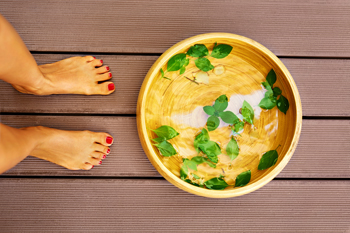
Our feet are often overlooked, but they play a critical role in our health and mobility, carrying us around throughout our lives. As we age, foot problems can intensify, potentially affecting our ability to live independently. The foot is a marvel of engineering, with 26 small bones intricately connected by ligaments, muscles, tendons, and cartilage. These components work in harmony to provide support and mobility. Neglecting foot health can lead to backaches, leg cramps, foot problems, and fatigue. To keep your feet in good condition, inspect them daily, moisturize dry skin, wear well-fitting shoes, exercise regularly, maintain proper hygiene, and trim your nails carefully. If foot problems, including athlete’s foot, corns, calluses, or ingrown toenails arise, it is important to get early treatment to avoid complications. Practicing a good foot care routine can help maintain healthy feet and put your best foot forward in life. If you would like to learn more about taking care of your feet, or if you encounter foot issues, it is suggested that you make an appointment with a podiatrist for further information and care.
Everyday foot care is very important to prevent infection and other foot ailments. If you need your feet checked, contact one of our podiatrists from Parkwood Podiatry. Our doctors can provide the care you need to keep you pain-free and on your feet.
Everyday Foot Care
Often, people take care of their bodies, face and hair more so than they do for their feet. But the feet are a very important aspect of our bodies, and one that we should pay more attention to. Without our feet, we would not be able to perform most daily tasks.
It is best to check your feet regularly to make sure there are no new bruises or cuts that you may not have noticed before. For dry feet, moisturizer can easily be a remedy and can be applied as often as necessary to the affected areas. Wearing shoes that fit well can also help you maintain good foot health, as well as making it easier to walk and do daily activities without the stress or pain of ill-fitting shoes, high heels, or even flip flops. Wearing clean socks with closed shoes is important to ensure that sweat and bacteria do not accumulate within the shoe. Clean socks help to prevent Athlete’s foot, fungi problems, bad odors, and can absorb sweat.
If you have any questions please feel free to contact our offices located in Brunswick and Hinesville, GA . We offer the newest diagnostic and treatment technologies for all your foot and ankle needs.
Are You Suffering From Ingrown Toenails?
Pain in the Ball of the Foot
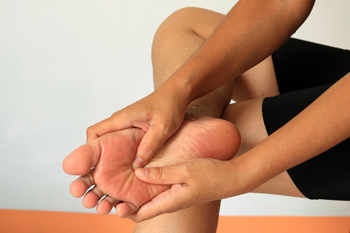
Much of the body's weight is supported by the metatarsals, the long bones of the foot. When these bones become inflamed or irritated, it results in a condition known as metatarsalgia, or more commonly, pain in the ball of the foot. This causes varying degrees of discomfort that can disrupt daily activities. Metatarsalgia is often seen in active individuals, as a result of overuse and high-impact activities like running and jumping. Constrictive footwear and high heels that create pressure around the metatarsals can also contribute to ball of foot pain. Being overweight increases the risk of developing metatarsalgia. Symptoms include pain between the toes and the arch, which can intensify during movement and ease when resting. Numbness around the toes, especially the big toe and second toe, is common. Stretching and strengthening foot muscles, as well as the Achilles tendon, are essential for recovery from metatarsalgia. Proper footwear with arch support can aid in cushioning the foot's arch and providing relief. Surgical options might be considered if other pain management remedies prove inadequate. If you are experiencing pain in the ball of the foot on a continual basis, it is suggested that you make an appointment with a podiatrist for a full examination and discussion of treatment options.
Foot Pain
Foot pain can be extremely painful and debilitating. If you have a foot pain, consult with one of our podiatrists from Parkwood Podiatry. Our doctors will assess your condition and provide you with quality foot and ankle treatment.
Causes
Foot pain is a very broad condition that could be caused by one or more ailments. The most common include:
- Bunions
- Hammertoes
- Plantar Fasciitis
- Bone Spurs
- Corns
- Tarsal Tunnel Syndrome
- Ingrown Toenails
- Arthritis (such as Gout, Rheumatoid, and Osteoarthritis)
- Flat Feet
- Injury (from stress fractures, broken toe, foot, ankle, Achilles tendon ruptures, and sprains)
- And more
Diagnosis
To figure out the cause of foot pain, podiatrists utilize several different methods. This can range from simple visual inspections and sensation tests to X-rays and MRI scans. Prior medical history, family medical history, and any recent physical traumatic events will all be taken into consideration for a proper diagnosis.
Treatment
Treatment depends upon the cause of the foot pain. Whether it is resting, staying off the foot, or having surgery; podiatrists have a number of treatment options available for foot pain.
If you have any questions, please feel free to contact our offices located in Brunswick and Hinesville, GA . We offer the newest diagnostic and treatment technologies for all your foot care needs.
What Can Be Done About Ugly Bunions?
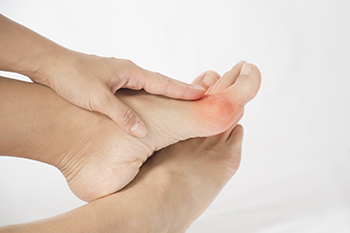
Bunions are bony deformities of the big toe joint. They are unattractive, are a common affliction, and can affect people of all ages. Medically, bunions are referred to as hallux valgus. The metatarsal bones in the foot fan out from the base near the ankle to each toe and the distance between them increases as they approach the toes. With bunions, the distance and angle at the base, between the first and second metatarsals, increases over time and a bump develops on a big toe joint. The foot widens and the deformed big toe joint presses uncomfortably against shoes. Pressure from shoes pushes the big toe towards the smaller toes, which emphasizes the bulge on the side of the foot. As time passes, the second toe can lie on top of the big toe and calluses and corns can develop on the toes, leading to further distortion and pain. Walking can also become problematic. If bunions are not tended to, arthritis can develop. It is not just shoes that contribute to bunion formation. Genes, gait, and being female can add to a propensity toward bunions. Wearing narrow-toed shoes or high heels for a prolonged time should be avoided because these types of shoes force the weight down to the ball of the feet and push the toes together. Insoles or orthotics can help and surgery for permanent removal may be an option. If you have a bunion or notice that one may be forming, it is suggested that you consult with a podiatrist who can give you advice and offer treatment options.
If you are suffering from bunions, contact one of our podiatrists of Parkwood Podiatry. Our doctors can provide the care you need to keep you pain-free and on your feet.
What Is a Bunion?
A bunion is formed of swollen tissue or an enlargement of boney growth, usually located at the base joint of the toe that connects to the foot. The swelling occurs due to the bones in the big toe shifting inward, which impacts the other toes of the foot. This causes the area around the base of the big toe to become inflamed and painful.
Why Do Bunions Form?
Genetics – Susceptibility to bunions are often hereditary
Stress on the feet – Poorly fitted and uncomfortable footwear that places stress on feet, such as heels, can worsen existing bunions
How Are Bunions Diagnosed?
Doctors often perform two tests – blood tests and x-rays – when trying to diagnose bunions, especially in the early stages of development. Blood tests help determine if the foot pain is being caused by something else, such as arthritis, while x-rays provide a clear picture of your bone structure to your doctor.
How Are Bunions Treated?
- Refrain from wearing heels or similar shoes that cause discomfort
- Select wider shoes that can provide more comfort and reduce pain
- Anti-inflammatory and pain management drugs
- Orthotics or foot inserts
- Surgery
If you have any questions, please feel free to contact our offices located in Brunswick and Hinesville, GA . We offer the newest diagnostic and treatment technologies for all your foot care needs.
Minor Wound Care Methods
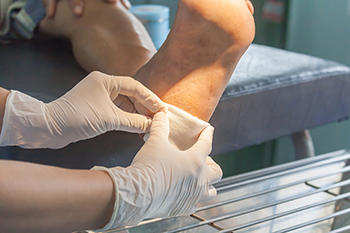
A wound is defined as damage to the skin’s surface. Wounds occur when there is a break in the skin due to a cut or scrape. A wound can also be caused by an animal bite and bedridden patients may develop bed sores. For mild wounds, proper wound care can begin with washing the hands, followed by holding a clean cloth on the affected area to help stop the bleeding. It is beneficial to rinse the wound with water and remove any dirt that has lodged inside of it. When the wound is dried, a bandage or gauze can be used to cover it. It is beneficial to change the dressing daily which may help to keep it free of bacteria that may accumulate from daily activities. If you have a wound on your foot, it is strongly suggested that you speak with a podiatrist who can treat and monitor the severity of the wound.
Wound care is an important part in dealing with diabetes. If you have diabetes and a foot wound or would like more information about wound care for diabetics, consult with one of our podiatrists from Parkwood Podiatry. Our doctors will assess your condition and provide you with quality foot and ankle treatment.
What Is Wound Care?
Wound care is the practice of taking proper care of a wound. This can range from the smallest to the largest of wounds. While everyone can benefit from proper wound care, it is much more important for diabetics. Diabetics often suffer from poor blood circulation which causes wounds to heal much slower than they would in a non-diabetic.
What Is the Importance of Wound Care?
While it may not seem apparent with small ulcers on the foot, for diabetics, any size ulcer can become infected. Diabetics often also suffer from neuropathy, or nerve loss. This means they might not even feel when they have an ulcer on their foot. If the wound becomes severely infected, amputation may be necessary. Therefore, it is of the upmost importance to properly care for any and all foot wounds.
How to Care for Wounds
The best way to care for foot wounds is to prevent them. For diabetics, this means daily inspections of the feet for any signs of abnormalities or ulcers. It is also recommended to see a podiatrist several times a year for a foot inspection. If you do have an ulcer, run the wound under water to clear dirt from the wound; then apply antibiotic ointment to the wound and cover with a bandage. Bandages should be changed daily and keeping pressure off the wound is smart. It is advised to see a podiatrist, who can keep an eye on it.
If you have any questions, please feel free to contact our offices located in Brunswick and Hinesville, GA . We offer the newest diagnostic and treatment technologies for all your foot care needs.
Certain Medical Conditions May Cause Cracked Heels
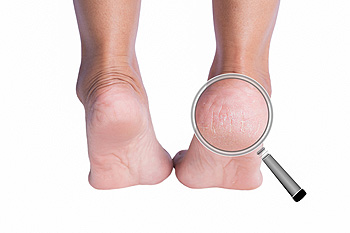
The foot condition that is known as cracked heels affects approximately 20 percent of adults throughout the country. Severely cracked heels are referred to as fissures, and may bleed and become infected. Cracked heels can happen from frequently wearing shoes that have an open back, or from standing on hard surfaces for most of the day. Having the correct knowledge of why this condition develops can be followed by implementing prevention strategies. These can include washing and drying the feet thoroughly, followed by applying a good moisturizer on them. It is helpful to avoid flip-flops when possible, and instead, it is beneficial to choose a shoe that has a cushioned heel. There may be existing medical conditions that may cause cracked heels to develop. These can include thyroid disorders, poor circulation, and elevated glucose levels. If you have cracked heels, it is suggested that you speak with a podiatrist who can offer you correct relief and treatment methods.
Cracked heels are unsightly and can cause further damage to your shoes and feet. If you have any concerns, contact one of our podiatrists from Parkwood Podiatry. Our doctors can provide the care you need to keep you pain-free and on your feet.
Cracked Heels
Cracked heels appear unappealing and can make it harder for you walk around in sandals. Aside from looking unpleasant, cracked heels can also tear stockings, socks, and wear out your shoes. There are several methods to help restore a cracked heel and prevent further damage.
How Do You Get Them?
Dry skin is the number one culprit in creating cracked heels. Many athletes, walkers, joggers, and even swimmers suffer from cracked heels. Age and skin oil production play a role to getting cracked heels as well.
Promote Healing
Over the counter medicines can help, especially for those that need instant relief or who suffer from chronic dry feet.
Wear Socks – Wearing socks with medicated creams helps lock in moisture.
Moisturizers – Applying both day and night will help alleviate dryness which causes cracking.
Pumice Stones – These exfoliate and remove dead skin, which allows for smoother moisturizer application and better absorption into the skin.
Change in Diet
Eating healthy with a well-balanced diet will give the skin a fresh and radiant look. Your body responds to the kinds of food you ingest. Omega-3 fatty acids and zinc supplements can also revitalize skin tissue.
Most importantly, seek professional help if unsure how to proceed in treating cracked heels. A podiatrist will help you with any questions or information needed.
If you have any questions, please feel free to contact our offices located in Brunswick and Hinesville, GA . We offer the newest diagnostic and treatment technologies for all your foot care needs.

